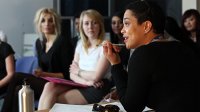3 Questions That Will Help School Leaders Navigate This Year
This simple framework gives administrators a way to help ensure that any changes made now will lead to measurable improvements.
Education is rooted in change. In fact, the very act of learning requires nimble navigation of processing, parsing, and pivoting new and known variables, continually checking understanding against introduced information.
Leading is no different.
To be the change, we must embrace meaningful change. And to make meaning, we must seek and synthesize feedback.
We can use the three questions below to audit the now, diving deeply to analyze culture and climate, previous practices, instructional efforts, and stakeholder relations. This simple three-step framework is applicable to any effort and provides you with a ready-made action plan to ensure that the changes you’re making are, in fact, making change.
What’s Worth Keeping?
Ever watched a space shuttle launch? Yes, a movie counts, too. Think about the mission control scenes. In those countdown moments, every system is checked, the engineers monitoring green lights just as closely as the yellow and red ones. This ensures sustained support for resources and efforts. If we don’t note what’s working, we risk scrapping a successful mission.
When evaluating what to keep, think about what efforts allowed for outcomes that align to your instructional why(s).
- What worked really well?
- Why was that? What was the outcome?
- What was better, and why was it better?
Example of keeping: In recent years, there has been wide adoption of technology in classrooms, and now, one-to-one programs are much more common. However, the success or failure of the initiative hinges on the vision and implementation. Thoughtful leaders work with stakeholders to analyze instructional practices and carefully consider what’s worth keeping. In other words, what do our highly skilled teachers do really well, and what does technology do really well?
What Needs Trashing?
Education is typically the only career that professionals have lived through during their formative years before going into practice. There are ideas that are so deeply ingrained in us that it takes intentional thought and effort to make a change.
As you consider what to trash, think about the practices that have a long history but don’t actually yield the desired results.
- What’s tanking?
- Why is that? What has the outcome been?
- What was bad, and why was it labeled as such?
Example of trashing: “Being a teacher is really easy,” said no educator ever. The responsibilities in any role of education are overwhelming, and we never feel caught up on our to-dos. Yet, with every effort to improve our schools, we rarely, if ever, think about what we could take off our overflowing plates. We know that collaborating with our peers is essential, and we have a finite amount of time in the day. Why not trash faculty meetings that only serve to distribute information that could easily be shared in a short email? You could always do a quick stand-up meeting and then give your team the gift of time to do other important tasks.
What Needs Tweaking?
We are sometimes quick to dismiss ideas or practices that are immediately unsuccessful, when all that is really needed is a closer look and minor shifts to get the desired outcomes.
- What can be tweaked?
- What has possibilities but needs a push?
- How will it improve learning?
- Who will it serve best?
Example of tweaking: The two of us have a lot of experience with professional learning, participating, planning, and facilitating. As leaders and learners, we’ve seen the good and the bad. We’ve seen the power of bringing in a consultant who inspires through stories that make us laugh, cry, and think. And we also know that there will be little, if any, change without ongoing, job-embedded support. Let’s tweak it! We can strategically bring in outside experts in person and also continue the work. Options include, but are not limited to, the following:
- Asking instructional coaches to meet with the consultant prior to the session so that they know the content and can support beyond the onetime event
- Bringing the consultant in remotely on a regular basis to spiral concepts and work through specific scenarios
- Asking teams to take ownership of specific topics and lead professional learning throughout the year
As you audit the now, listen carefully to stakeholders and deeply reflect; it’s crucial that the changes made based on community feedback are shared with full transparency. We often ask for feedback, but we don’t always share how that feedback is used, which can lead to frustration, apathy, and distrust.
Leading change requires us to make incremental, real-time adjustments to ensure that our work supports the needs of our conditions. Mindfully monitoring experiments and efforts allows us opportunities to consider the roles that agency, choice, and dynamic practice play in sustainable change. When we feel overwhelmed, we can take that collective deep breath, analyze where we are, and figure out what we need to do next to create meaningful change.
